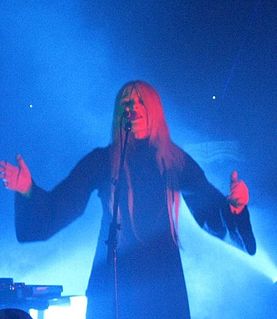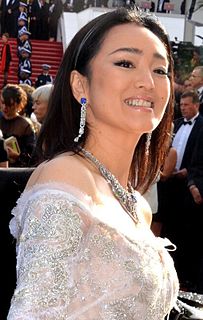A Quote by Lars von Trier
We start with a rehearsal where the actors kind of bring what they think should be in the scene. But we film everything, and we use cuts of this first take, also.
Related Quotes
Everything we do on 'Luck' is absolutely no different than if we'd had been doing it in a feature film. There's no short cuts. The specificity of what every single line might mean. Everything Dustin Hoffman does. Kevin Dunn is as authentic in the last scene of the last episode as he is in the first scene of the first episode.
In theater, there's a lot of discipline involved in doing eight shows a week for a year and a half. It's nice to be able to bring some of that bag of tools with you over to the film world, where you don't have the rehearsal, you don't have an audience. You don't have a month of rehearsal to examine these words, and you meet the guy who's going to play your brother the morning that you shoot the scene. So you need a bag of tools.
In Korea is what I do is I watch the playback of each take with all of the actors and spend a lot of time discussing each take. Also, I use the process we call auto-assembly because I storyboard my entire film right at the beginning, even before pre-production ever begins, so my vision is already laid out on the storyboard for everybody to share. It enables the on-set assembly person, as we call them, to cut together each take into a sequence. This enables a director to review the take within the context of the sequence of the scene.
It is true that as he film market in China has grown, actors' and actresses' compensation has grown quite a bit. Different actors have different kind of deals. Some take percentages, some sign contracts with a company, some take a simple cash payment. But the growth also means there are many more actors out there. Competition has gotten much stiffer, too.
Now I realize that I have to let everyone take what they have to take from the film. No matter what I think about the film, it becomes a little irrelevant. I think I would say that the film is trying to show us that - and I spoke about that earlier - we have to let the teachers invest in their own classroom. There's no use in trying to control everything. Education is fundamental.
I'm the first secretary of defense that's had to deal with sequestration. I've prepared two budgets that deal with sequestration. And you bring the chiefs together, the leadership of this enterprise together, to work through, how do we then take these cuts? Where do we apply those cuts? Readiness is the first thing that suffers.
Your first film is always your best film, in a way. There's something about your first film that you never ever get back to, but you should always try. It's that slight sense of not knowing what you're doing, because the technical skills you learn - especially if you have a film that works, that has some kind of success - are beguiling. The temptation is to use them again, and they're not necessarily good storytelling techniques.
Sometimes I'll have a scene that strikes me, I just feel like writing a scene, a mini-story that seems like it might lead somewhere. But that is such a tentative, fishing-hook way to go about it that these days I've found it's easier to kind of at least have your concept and start attaching things to a skeleton. So I try to find the armature, the kind of backbone of it first that you can start to hang those scenes on.





































